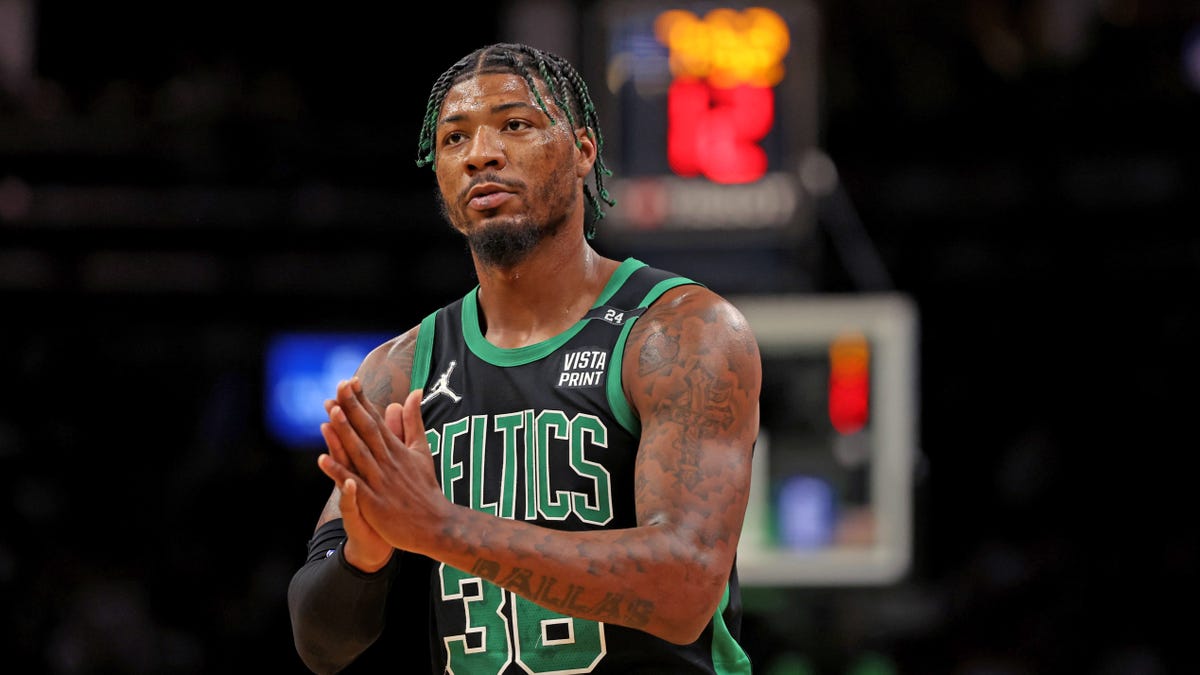

The most surprising aspect of the Boston Celtics in-season turnaround was that the team did it with a position change rather than trading a major asset. Acquiring Derrick White helped with some much-needed guard depth, but really Marcus Smart being allowed to run point solidified his role and gave him direction and purpose.
Early in the season, he was outspoken about his displeasure with standing in the corner and waiting for Jayson Tatum and Jaylen Brown to pass him the ball, and I defended the two young Celtic wings, because letting Smart make decisions often ended in him taking bad shots in key moments.
Fast forward to Celtics-Nets Game 1 on Sunday, which was definitely the highlight of these young playoffs thus far. When the ball found its way into Smart’s mitts with 3 seconds and counting on the clock and Boston down a point, a “not again” moment flashed in the minds of the onlookers at TD Garden. Biggest moment of the game, and it’s happened again: Marcus Smart is going to decide our fate and this crucial contest is going to come down to whether he makes a contested 3. Only the player who made his reputation by hoisting ill-timed and misfired shots, opted to pump fake and play-make instead.
Being able to maintain clarity amid a mad scramble is an attribute that can’t be taught or developed. Smart not only had to be aware of the doomsday clock but also needed to keep his head up to find a cutting Tatum. And even then he still needed to deliver a good-enough pass to allow the recipient to catch, spin, and lay the ball through the hoop in one fluid, less-than-two-seconds motion.
It was one of those “presence of mind” moments that reminds fans of players like Reggie Miller or Ray Allen seeking out the 3-point line during chaotic comebacks. It was not one we readily associate with a guy like Smart who expends so much energy and heart on the defensive side of the ball that we attribute his effectiveness more to hustle than basketball IQ.
I’m not saying he doesn’t play hard; Steph Curry and the rest of the guys who’ve caught collateral damage from one of his dives or lunges in a regular-season game can attest to Smart’s motor. What I’m saying is successfully playing passing lanes, deflecting dribbles, and disrupting offenses takes more than simply trying really hard.
G/O Media may get a commission
Yes, effort is involved, but so is a vast knowledge of NBA offenses and progressions, being in the right place at the right time. Look at Draymond Green and listen to pundits rave about his intellect. Smart isn’t thought of in the same context because all Brad Stevens asked him to do on offense was stand in the corner and shoot 3s, something he’s not great (or even really good) at. Imagine how we’d talk about Green if the Warriors relegated him to a glorified spot-up shooter rather than a point center.
Also, when all you’re tasked with doing on offense is spreading the floor, I don’t care who you are, you’re going to chuck up some bad shots because that’s the only way you’re allowed to affect the game. I mistook Smart’s frustration with his teammates and role as a guy who wanted to get in on the hero ball act. That’s not what he desired at all. He wanted to impact the game, so he found (and forced) the few opportunities to do so that came his way.
A new coach can provide a new perspective, and Ime Udoka’s trust in Smart to handle the ball and facilitate helped unlock the Celtics’ previously semi-tapped potential. It turns out, the position he played in high school and college, the one that got him drafted sixth overall, and the one that the Celtics have been so desperate to fill, was indeed his position all along.
He’s attempting almost two less 3s per game than last year (down to 5.1 from 5.9), and is dishing out a career-high 5.9 assists per contest, according to BasketballReference. He’s not Steve Nash (or even Draymond) from a playmaking standpoint, but that’s not what Tatum or Brown needs because they can create their own shots. The team needed a way to get him to buy into his role because his defense is invaluable, and maybe merely letting him bring the ball up the court flipped a switch, like “OK, I have to look for other guys rather than look for my own shot because the onus is now on me to get everyone involved.”
That would make sense because he clearly values the traditional duties of a point guard (i.e. passing), which is probably why he called out Brown and Tatum for hogging the ball in the first place. And first place is where Boston probably would’ve found themselves heading into the postseason had Robert Williams not gotten hurt.
The Celtics ended up in the two spot, and earned a Game 1 ‘W’ against the team that sent them home in five a year ago. Boston’s regular-season success didn’t go unnoticed, and surely neither will its playoff run if it continues.
Additionally, when your squad is good enough to garner non-homer hype, your contributions are harder to ignore. The eighth year player out of Oklahoma State has been one of the best defensive guards since he came into the NBA, but now he’s a point guard and the Defensive Player of the Year. He’s the first guard to win that recognition since Gary Payton, who actually presented him with the award in a very cool moment.
Anyone who has watched Smart frustrate his opponents for nearly a decade knows that he plays winning, All-NBA defense. But they didn’t know if he was a winner. They do now.